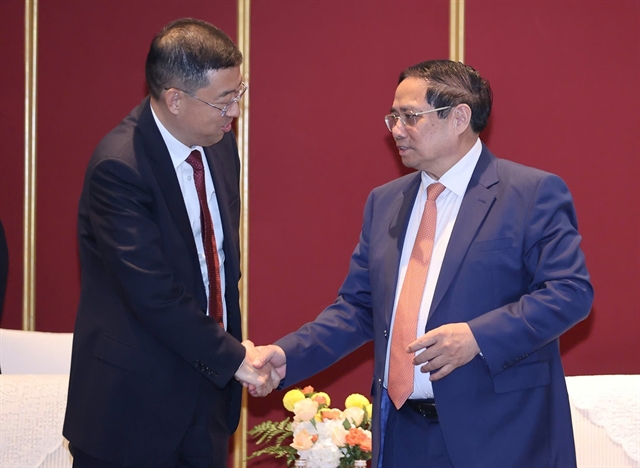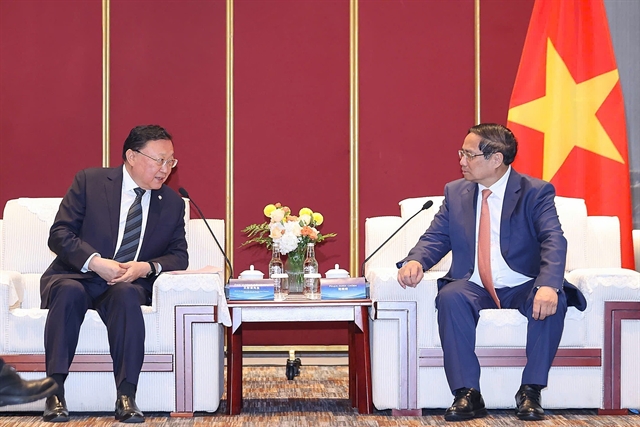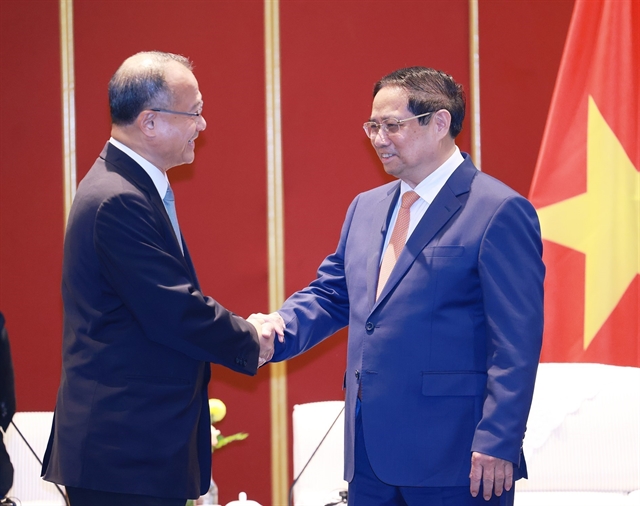 Economy
Economy

 |
| Prime Minister Phạm Minh Chính (right) had a meeting with Chairman of the Bank of China (BOC) Ge Haijiao in Tianjin, China, on June 24. — VNA/VNS Photo |
TIANJIN — Prime Minister Phạm Minh Chính had meetings with leading corporations of China on Monday to discuss advancing cooperation with Việt Nam in infrastructure development, finance, trade, and investment.
The event took place as part of his working trip to China, during which he attends the 16th Annual Meeting on the New Champions of the World Economic Forum (WEF) in Tianjin (WEF Tianjin).
Talking to the Vietnamese leader, Chairman of the Bank of China (BOC) Ge Haijiao said BOC opened a branch in Việt Nam in 1995 – the first of a Chinese bank to be licensed in the country, and it is running productively.
BOC wishes to boost its presence and investment in the Vietnamese market, and is ready to provide comprehensive financial services for large infrastructure projects.
PM Chính applauded BOC’s operations which, he said, have contributed to local socio-economic development.
He asked the bank to continue expanding operations in Việt Nam, help promote financial and monetary cooperation between the two countries, and supply concessional and large capital for priority fields in Việt Nam. He suggested it share experience as Việt Nam is drafting a financial centre development plan.
The PM recommended that BOC cooperate with not only the public sector but also the private sector of Việt Nam, and participate in handling poor-performing banks. He affirmed that the Vietnamese Government will accompany and create favourable conditions for foreign enterprises, including Chinese ones like BOC, to invest and do business effectively, successfully, and sustainably.
 |
| PM Phạm Minh Chính (right) and Chairman of the China Communications Construction Company (CCCC) Wang Tongzhou. — VNA/VNS Photo |
At the meeting with Chairman of the China Communications Construction Company (CCCC) Wang Tongzhou and senior leaders of the firm – a world’s leading business in infrastructure development present in Việt Nam for over 30 years, PM Chính highly valued CCCC’s fruitful operations in the country, particularly in developing infrastructure, including railway systems.
Wang said his company wishes to continue engaging in key infrastructure projects in Vietnam such as the Lào Cai – Hà Nội – Hải Phòng railway, the North – South high-speed railway, metro lines in Hà Nội and HCM City, seaports like Lạch Huyện and Cần Thơ, as well as expressway and offshore wind power projects.
PM Chính welcomed CCCC’s interest and plans to expand cooperation in Vietnam, affirming the Vietnamese Government’s consistent policy of encouraging the development of railway infrastructure technology and promoting technological self-reliance in the sector.
He suggested that CCCC explore potential collaboration with the Việt Nam Railways Corporation, as well as with the railway management boards of Hà Nội and HCM City. In particular, he proposed that the company consider public-private partnership (PPP) models in Việt Nam.
Also on June 24, PM Chính held a working session with Chen Wenjian, Chairman of China Railway Engineering Corporation (CREC), and senior leaders of the group.
Chen highlighted CREC’s position as one of the world’s largest construction contractors, with projects accounting for over two-thirds of China’s total railway mileage. In Việt Nam, CREC has been operating since 2005, engaging in major projects such as the Dung Quất shipbuilding plant, the modernisation of signalling systems along the Vinh–Sài Gòn rail route, the Hà Nội urban railway, and wind power projects. The company’s total value of awarded contracts in Việt Nam has reached around US$1 billion.
CREC hopes to further contribute to infrastructure development in Việt Nam, Chen said, proposing the consideration of investment cooperation models applicable to railway and urban transport projects in Hà Nội and HCM City.
PM Chính welcomed the Chinese enterprise's plans to invest and do business in Việt Nam and appreciated CREC’s interest in railway and metro development. He provided an overview of Việt Nam's infrastructure development strategy and ongoing railway projects, expressing hope that CREC will build on past cooperation and continue its investment in Việt Nam.
He particularly encouraged CREC to participate in railway projects linking Vietnam and China, such as the Hải Phòng – Hà Nội – Lào Cai, Đồng Đăng – Hà Nội, and Hải Phòng – Móng Cái lines, as well as in the North – South high-speed railway. In the near future, the PM urged CREC to work closely with relevant Vietnamese authorities to promptly conclude and implement specific cooperative projects.
During a working session the same day with Dai Hegen, Chairman of China Railway Construction Corporation (CRCC), one of the world’s leading and most comprehensive construction conglomerates, PM Chính stated that he just had very successful talks with his Chinese counterpart Li Qiang, during which both sides agreed to accelerate the implementation of railway projects connecting the two countries.
The leader informed the CRCC delegation that Việt Nam is urgently carrying out the necessary preparations to begin construction of the Hải Phòng – Hà Nội – Lào Cai rail line by the end of 2025. He urged CRCC to work closely and swiftly with relevant Vietnamese agencies to join the project at the earliest.
Alongside this, CRCC was also asked to consider cooperation activities such as providing financial and technical support for pilot projects; transferring railway technology; cooperating in research and human resources training; and giving support in terms of management models, policies, legal regulations, and financial mechanisms for infrastructure development, particularly for Việt Nam's railway sector.
 |
| Prime Minister Phạm Minh Chính received Jonathan Choi, Chairman of the Hong Kong-based Sunwah Group and Chairman of VinaCapital Việt Nam on June 24 in China. — VNA/VNS Photo |
The same day, PM Chính received Jonathan Choi, Chairman of the Hong Kong-based Sunwah Group and Chairman of VinaCapital Việt Nam. He spoke highly of the group’s business performance in Vietnam and welcomed its investment expansion plan.
He encouraged the group to invest in high-tech industries, green development, circular economy, and social housing. He also called for increased investment in raw material zones, science and technology, and deep processing in the agricultural sector.
The PM asked the group to help Vietnamese companies integrate into its supply chain and contribute to high-quality human resources training in Việt Nam.
In the evening, PM Chính received Professor Tao Yitao, Director of the China Special Economic Zone Research Centre and President of the Belt and Road Research Institute for International Cooperation and Development at Shenzhen University.
Expressing his gratitude to the PM for making time for the meeting despite his busy schedule, Tao expressed confidence that the PM's visit to China will provide strong momentum for bilateral cooperation in various fields.
He shared that he is working with China’s border provinces to coordinate with Vietnamese provinces in developing cross-border economic zones.
Acknowledging Tao’s contributions to researching and proposing special economic zone models in China, PM Chính highlighted his long-standing interest in establishing joint cross-border economic zones, dating back to his tenure as Party Secretary of Quảng Ninh Province. He noted that he has assigned Lào Cai and Quảng Ninh provinces to work with their Chinese counterparts to consider developing such zones.
The PM suggested the professor continue studying and proposing a joint cross-border economic zone model suitable to the current context, the size of the two economies, and bilateral relations, while aligning with development trends and priority sectors.
Agreeing to consider the professor’s proposals to hold an international forum on special economic zones in Việt Nam, establish a joint research institute, and build a Việt Nam – China cultural centre for academic and cultural exchanges, the PM said he will assign relevant ministries and localities to work with the Chinese side.
The leader also expressed his hope that Tao will advise Việt Nam on economic development models to help the country achieve 8 per cent growth in 2025 and double-digit growth in the following year in pursuit of its centennial goals. — VNS